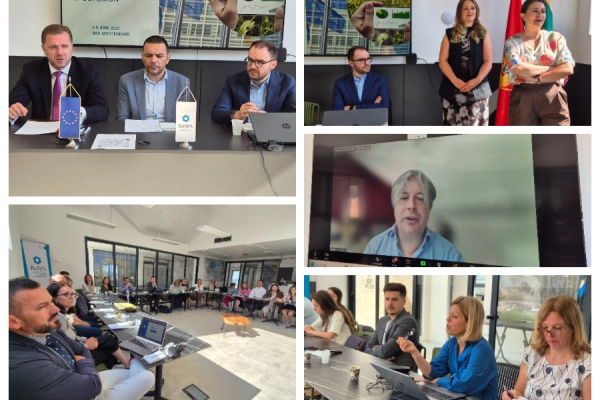
Cluster 5 Training Module: Strengthening Administrative Capacities in Resources, Agriculture and Cohesion
3–5 June 2025, Bar, Montenegro
A three-day training gathered public officials, experts, and regional stakeholders to strengthen administrative capacities related to Chapter 11 (Agriculture and Rural Development), Chapter 12 (Food Safety, Veterinary and Phytosanitary Policy), Chapter 13 (Fisheries and Aquaculture), and Chapter 22 (Regional Policy and Coordination of Structural Instruments).
This module is delivered as the third in a series of modules on negotiation clusters, designed to support EU integration and structural reforms in the Western Balkans.
DAY I: Agriculture and Rural Development
On the first day, attendees were welcomed by Miroslav Cimbaljević, , Director General of Directorate for Agriculture within MAFWM and Head of NWG, Ministry of Agriculture, Forestry and Water Management of Montenegro, Naim Gjokaj, State Secretary of the Ministry of Public Administration of Montenegro and Gentian Xhaxhiu, Program Coordinator at ReSPA, who underlined the importance of Cluster 5 in the context of EU negotiations and emphasizing the need for regional cooperation and capacity building.
Gilles Kittel from DG REGIO addressed the EU Cohesion Policy, providing insights into its objectives, funding mechanisms, and integration into national strategic frameworks. Ana Živanović shared a local perspective on EU project financing, highlighting the Municipality of Bar’s experience in managing EU funds. She reportedly emphasized challenges and opportunities faced at the municipal level. Nikša Tkalec, an expert in Common Agricultural Policy, led sessions outlining the evolution of the EU CAP, key developments, and the Western Balkan region’s alignment efforts. He reportedly stressed the significance of policy convergence and market readiness in the agricultural sector. In the afternoon, Ružica Gelo conducted an in-depth analysis of Chapter 11, describing it as a "moving target" due to evolving policy frameworks. She shared lessons from previous EU enlargements and underscored current expectations in the new Multiannual Financial Framework. Participants reportedly discussed practical negotiation tactics and the dual-pillar approach of CAP.
DAY II: Food Safety and Cohesion Policy
The second day was centered on Chapter 12 and EU cohesion policy. Sanja Šeparović, a leading expert in Chapter 12 negotiations, reportedly presented a comprehensive overview of food safety systems, legal alignment requirements, and the role of GMOs. She also provided participants with practical tips for accession negotiations and highlighted institutional responsibilities. The discussion moved to the integrated EU approach to food safety, where Šeparović emphasized cross-sector collaboration and risk-based regulation frameworks. A session on stakeholder roles reportedly followed, underlining the importance of multi-level governance in successful EU alignment.
The afternoon was dedicated to cohesion policy. Experts Martina Škvorc and Tamara Lachowski presented the architecture of EU cohesion funding and the regional development framework. They led detailed discussions on programming documents, capacity-building plans, and monitoring mechanisms aligned with EC standards.
Participants appreciated the balanced combination of theory and practical application, especially during the session on monitoring and evaluation procedures. The day concluded with a guided tour of the Old City Bar and a networking dinner, fostering informal collaboration among attendees.
DAY III: Financial Management and Fisheries
The final day opened with a session on financial management, control, and auditing within Chapter 22. Experts Škvorc and Lachowski walked participants through budgeting practices, payment execution, and audit report requirements. A short quiz was conducted to reinforce key learning points, which reportedly stimulated high engagement.
Later, Mirta Novak presented the EU’s Common Fisheries Policy, offering a comparative analysis of fisheries policy development across different accession countries. She reportedly emphasized sustainable fisheries management and data-based policy planning.
The training concluded with Novak’s insights into legal alignment in fisheries and the technical aspects of negotiating Chapter 13. Participants reportedly appreciated the clarity and real-world relevance of her examples, which helped demystify often misunderstood components of fisheries-related negotiations.
The training reinforced the European Union’s commitment to the Western Balkans and highlighted the necessity of synchronized reforms, particularly in agriculture, food safety, fisheries, and cohesion funding. It offered a unique platform for peer exchange and mutual support, critical for the next stages of the negotiation process.



